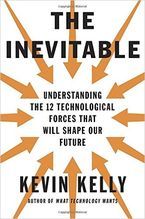 Where is culture headed for the next decade? And what does this mean for our relationships, jobs, and task as apologists and influencers of the next generation? I recently read the excellent book and want to highlight the twelve trends that the author, Kevin Kelly, believes will shape the future. It’s hard to disagree with his insights.
Where is culture headed for the next decade? And what does this mean for our relationships, jobs, and task as apologists and influencers of the next generation? I recently read the excellent book and want to highlight the twelve trends that the author, Kevin Kelly, believes will shape the future. It’s hard to disagree with his insights.
1. BECOMING: The future will be characterized by perpetual upgrades and the discontent that comes from constant change. Everything will be in flux. This future becoming will not be driven by big institutions, but by active consumers who participate in the emerging culture.
2. COGNIFYING: Artificial Intelligence (AI) is changing everything. By 2026, Google’s main product will not be search, but AI. In the future, people will simply plug into AI as if it was electricity. According to Kelly, before the end of this century, AI will replace 70% of today’s jobs (including yours).
3. FLOWING: Indiscriminate copying is here to stay. Information will flow and it cannot be stopped. This raises a powerful question: When information is endlessly available, what will people truly value? He provides a few thoughts including authenticity, personalization, and immediacy.
4. SCREENING: Books changed the way people thought. Now ubiquitous screens are changing the way people see the world. Books emphasize logic but screens emphasize pixels. According to Kelly, ‚ÄúIn books we find a revealed truth; on the screen we assemble our own myths from pieces‚ÄĚ (p. 104).
5. ACCESSING: Possession is no longer as important as it once was. Now access is supreme. In the future, many people will not own music, games, books, art, cars, and other things because they will have instant access to them because of the cloud or some other form of technology.
6. SHARING: A billion people spend a considerable part of their day creating content for free. People are increasingly sharing their lives with others, in areas such as what you’re thinking (Twitter), reading (StumbleUpon), finances (Motley Fool Caps), and everything (Facebook). Shared content in the next decade will dwarf the last half-century.
7. FILTERING: The Internet has created an overwhelming overload of information. Who do we trust? Where do we spend our time? As a result, there is tremendous value in personal and professional filters. For instance, Netflix has 300 people working on its recommendation system, with a budget of $150 million.
8. REMIXING: In the future, people will be able to record every conversation and experience they have. And we will be able to access all those experiences easily. And we will get impatient with experiences that don‚Äôt have ‚Äúundo‚ÄĚ buttons, such as eating a meal.
9. INTERACTING: Completely believable virtual reality (VR) is nearly here. The lines between reality and virtual reality will continue to blur. Devices will increasingly be equipped with sensors so we can interact with them and embedded VR will be a normal part of life.
10. TRACKING: People will begin to lifelog, which means recording every moment of their lives. People will be able to browse their lifestream. And surveillance will become ubiquitous. Even with concerns over sharing too much, according to Kelly, people still offer information about their lives because vanity trumps privacy.
11. QUESTIONING: Given that there is endless access to information, people will be less certain of their beliefs than in the past. Truth no longer comes from an authority, but is assembled individually from one’s own stream of information. Knowledge is expanding rapidly, but according to Kelly, questions are expanding exponentially.
12. BEGINNING: The information revolution is just beginning. In the future, people will look back at our lives today and wish they could have witnessed the birth of the moment humans began animating inert objects and linking everything together in the cloud.
Of course, these ideas are all educated guesses. Technology is changing fast, and so there will inevitably be breakthroughs we can’t even imagine in the present. But overall Kelly is onto some powerful trends. And we ignore them at our own peril.
Since knowledge is power, these trends raise some powerful questions for reflection. Consider a few: What is our attitude toward these changes? Do we fear them or embrace them, and why? How can we best use these technological trends to communicate the gospel? How will we defend the faith in the next decade? How will we think theologically about these new technological changes? And how can we trust God when the world around us is changing fast?
Thanks to Kelly for his excellent research. I hope you will consider getting a copy of his book and wrestling through these kinds of questions yourself.
You can find on .
 ļŕ›ģ ”∆Ķ
ļŕ›ģ ”∆Ķ
.jpg)


